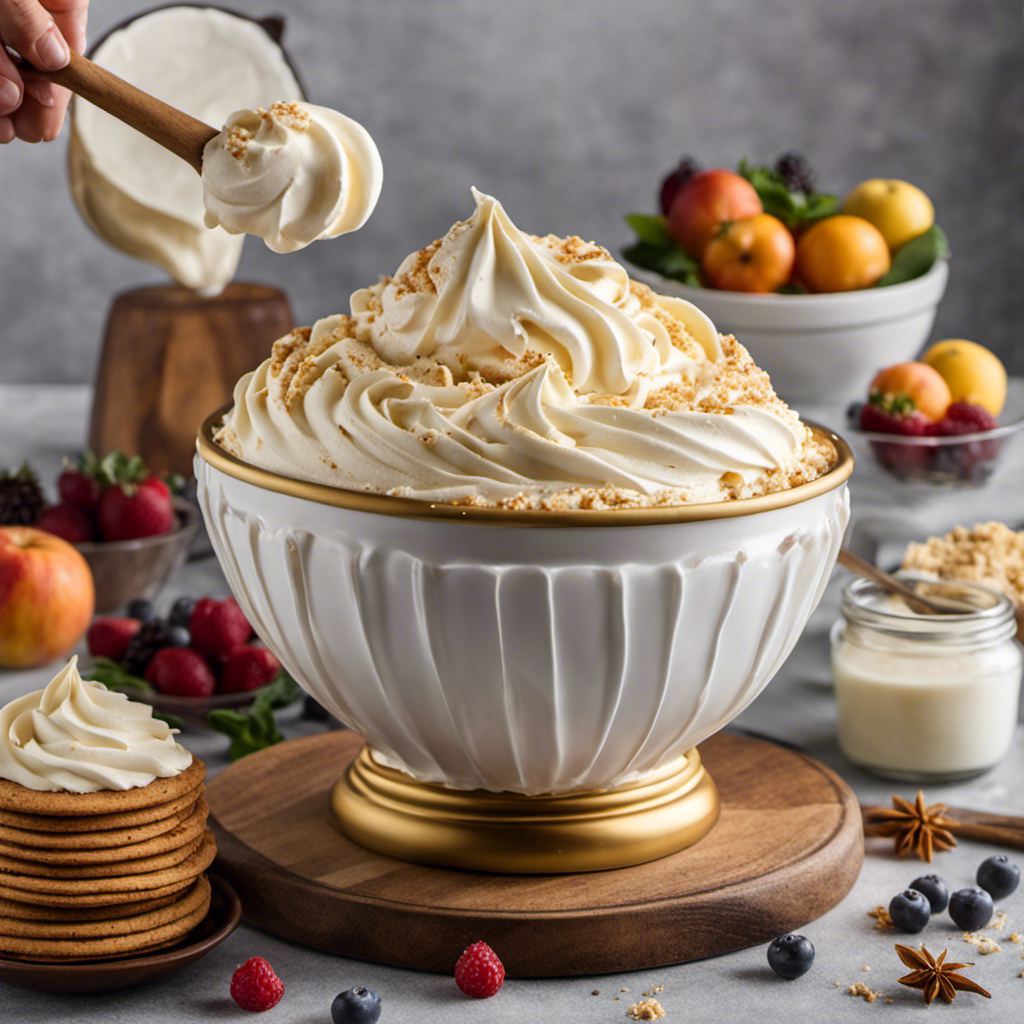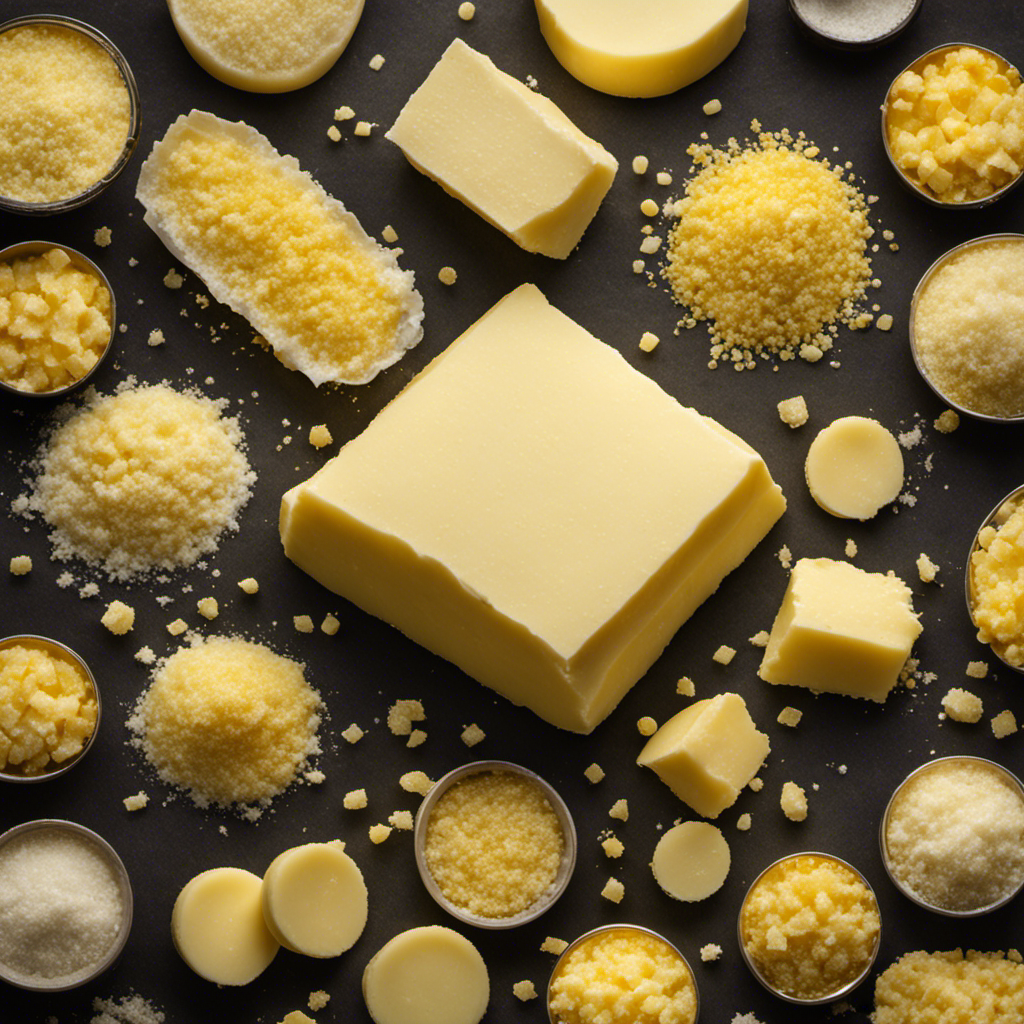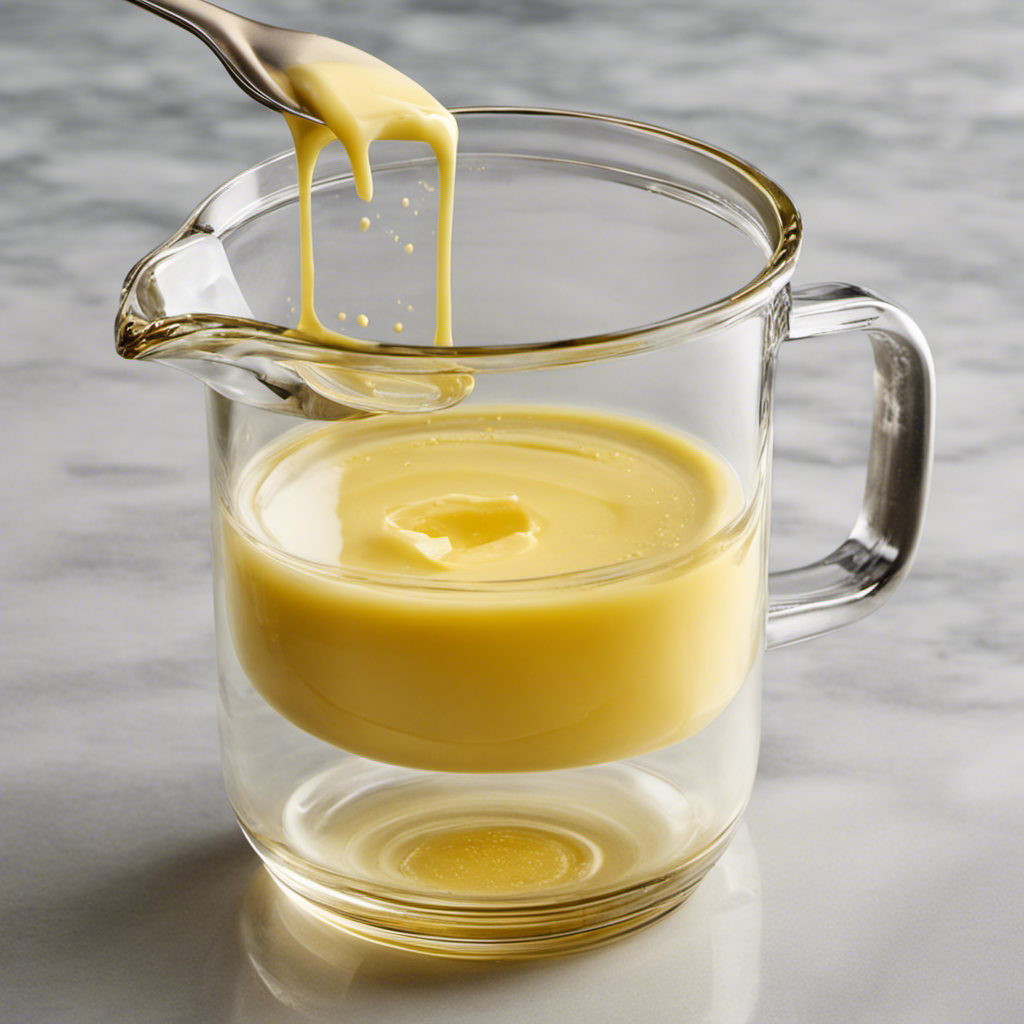Upon opening the container, I was immediately repulsed by the strong smell of spoiled butter that hit my nostrils.
In this article, I will delve into the science behind the foul odor of rancid butter, providing you with the tools to identify it by smell.
We will explore the common causes of butter going rancid and how it can impact the quality of your food.
Additionally, I will share valuable tips to prevent your butter from turning rancid and ruining your culinary creations.
Key Takeaways
- Rancid butter smells bad due to chemical reactions and microbial growth.
- The odor of rancid butter resembles old oil or nuts and can have a slightly cheesy or musty aroma.
- Rancid butter negatively impacts the taste and texture of food, resulting in a bitter and unpleasant taste and grainy, greasy textures.
- Proper storage in an airtight container and cool temperature can prevent butter from turning rancid.
The Science Behind Rancid Butter Odor
Rancid butter smells bad because the fats in the butter have broken down due to chemical reactions and microbial growth.
When butter is exposed to air, the fats undergo a process called oxidation. This occurs when the double bonds in the fatty acids react with oxygen, resulting in the formation of compounds known as free radicals. These free radicals then react with other components in the butter, causing a chain reaction that leads to the breakdown of the fats.
Additionally, microbial growth, especially by bacteria and molds, can contribute to the rancid smell of butter. These microorganisms produce enzymes that break down the fats further and release volatile compounds that give off the unpleasant odor.
Overall, the combination of chemical reactions and microbial growth is responsible for the distinctive smell of rancid butter.
Signs to Identify Rancid Butter by Smell
It’s easy to identify rancid butter by its foul odor. When butter goes rancid, it develops a distinct smell that is hard to miss. Here are some signs to help differentiate between rancid butter and spoiled cheese:
- Rancid butter has a strong, pungent smell reminiscent of old oil or nuts.
- The odor of rancid butter is different from the sour smell of spoiled cheese.
- Rancid butter may also have a slightly cheesy or musty aroma.
- Spoiled cheese, on the other hand, has a distinct sour, fermented smell.
- Rancid butter can have a sharp, unpleasant scent that lingers.
Identifying rancid butter is crucial because it can greatly impact butter-based recipes. It can alter the taste and aroma, resulting in an unpleasant final product.
Now, let’s delve into the common causes of butter going rancid.
Common Causes of Butter Going Rancid
To understand why your butter may go bad, it’s important to be aware of the common causes that lead to its deterioration.
The main cause of rancid butter is the oxidation of its fats. When butter is exposed to air, the fats in it react with oxygen, resulting in the formation of free radicals. These free radicals can cause the fats to break down, leading to the development of off-flavors and odors.
Another cause of rancidity is the presence of bacteria or other microorganisms in the butter. These microorganisms can produce enzymes that break down the fats, causing the butter to go rancid.
Storing butter properly, in an airtight container and at a cool temperature, can help prevent these causes and prolong its freshness.
Transitioning into the next section, it is important to understand how rancid butter affects food quality.
How Rancid Butter Affects Food Quality
When butter becomes spoiled, it can negatively impact the taste and texture of food. Rancid butter not only affects the flavor of dishes but also poses risks to our health.
Here are some effects of rancid butter on health and the impact it has on recipe outcomes:
-
Unpleasant taste: Rancid butter has a bitter and unpleasant taste, which can ruin the overall flavor of a dish.
-
Foul odor: Rancid butter emits a strong and pungent smell that can be off-putting to anyone near it.
-
Textural changes: Rancid butter becomes grainy and greasy, leading to undesirable textures in recipes.
-
Reduced nutritional value: Rancid butter may lose some of its essential nutrients, diminishing its health benefits.
-
Digestive issues: Consuming rancid butter may cause stomach discomfort, diarrhea, and other digestive problems.
Understanding these effects highlights the importance of preventing butter from turning rancid. By following some simple tips, we can ensure the freshness and quality of our butter.
Tips to Prevent Butter From Turning Rancid
By properly storing butter in the refrigerator, you can extend its shelf life and prevent it from becoming rancid. Storing butter properly is crucial to maintain its freshness and flavor.
It is recommended to keep butter in an airtight container or wrap it tightly in aluminum foil or wax paper. This helps to prevent the absorption of odors and flavors from other foods in the refrigerator.
Additionally, it is important to use butter within its expiration date. The expiration date indicates the time frame in which the butter is at its best quality and flavor. Using butter beyond its expiration date increases the risk of it becoming rancid.
Therefore, always check the expiration date before using butter in your recipes to ensure its freshness and avoid any unpleasant taste or smell.
Frequently Asked Questions
How Long Does It Take for Butter to Go Rancid?
Butter can go rancid within a few weeks if not stored properly. To prevent this, store butter in an airtight container in the refrigerator. Signs of rancid butter include a sour smell and a yellowish color.
Can Rancid Butter Make You Sick?
Rancid butter can cause food poisoning and negatively impact the taste of dishes. It is important to recognize the signs of rancidity, such as a sour smell or taste, to ensure food safety and enjoyable meals.
Does Rancid Butter Lose Its Nutritional Value?
Rancid butter does not lose its nutritional value, but it should not be consumed due to potential health risks. If you notice signs of rancidity, such as a sour smell or off taste, consider using rancid butter alternatives.
Can You Still Use Rancid Butter for Baking?
Yes, you can use rancid butter for baking, but it will affect the taste and quality of your baked goods. However, it is advisable to use alternatives like fresh butter or other oils to avoid unpleasant flavors in your cooking.
Is It Safe to Eat Rancid Butter if Cooked at High Temperatures?
If cooked at high temperatures, using rancid butter could pose health risks. It is important to identify rancid butter before cooking by checking for a foul smell, mold, or off-color appearance. Consider alternative butter options for high temperature cooking.
Conclusion
In conclusion, the smell of rancid butter is a force to be reckoned with. It hits you like a punch in the face, with its putrid, nauseating stench. It’s as if a thousand rotten eggs and spoiled milk decided to have a party in your nostrils.
Trust me, you won’t be able to escape the overwhelming odor. But fear not, for armed with this knowledge, you can now detect and prevent the evil that is rancid butter from infiltrating your culinary endeavors.
Stay vigilant, my friends, and may your butter always be fresh and delightful.










